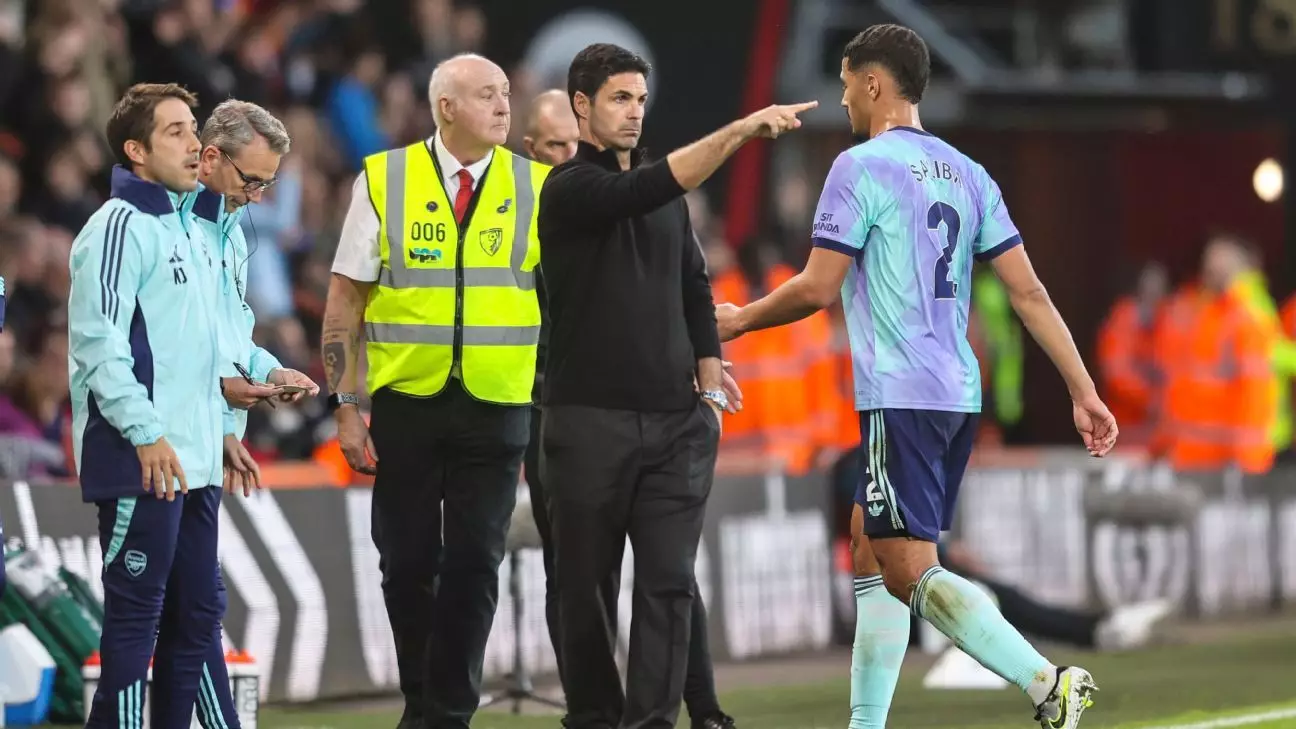Arsenal’s recent performances in the Premier League have showcased a disturbing trend that could derail their season ambitions: a troubling pattern of ill discipline. Mikel Arteta, the head coach, has vocalized the urgency for his team to “eradicate” the issues that have led to three red cards within just eight league matches. This alarming statistic not only reflects poorly on the team’s composure but also signifies a broader mental hurdle that must be overcome if Arsenal aims to maintain its status as a title contender.
The red card received by William Saliba during the 2-0 defeat to Bournemouth marked the latest episode in a worrying sequence. Earlier dismissals for Declan Rice and Leandro Trossard, against Brighton and Manchester City respectively, hint at an underlying crisis in discipline. Arteta acknowledged the diverse circumstances surrounding each ejection but emphasized a consistent theme: playing with a diminished squad is inherently disadvantageous. “We cannot continue to play with ten men at this level,” he stated, highlighting an essential requirement for success at the elite level.
While Arsenal’s defeat to Bournemouth represented their first loss of the campaign, the repercussions extend far beyond the immediate game. Arteta’s assertion that his players must channel the “pain” of this defeat into future encounters raises critical questions about the team’s mentality. Drawing from setbacks can be transformative, yet it requires an ability to manage emotions and regroup effectively. In a high-pressure league, this capacity is vital; yet, the frequent lapses in discipline suggest a team struggling to navigate the tension of competitive play.
Reacting poorly to accumulated stress not only hinders player performance but can also become contagious within the squad. Arteta’s acknowledgment of this reality indicates a potential rift where frustration could fester. Players must learn to maintain composure and emotional regulation during critical moments in matches, especially when tensions run high. A mindset that treats discipline as paramount will be essential to avoid any more unnecessary setbacks.
Another dimension contributing to Arsenal’s current vulnerabilities lies in the fitness of key players. With club captain Martin Ødegaard and prominent winger Bukayo Saka sidelined due to injuries, Arteta’s tactical flexibility and options are severely tested. While Saka’s return could be imminent, Ødegaard’s absence is a larger blow to team morale and structure. The question of depth becomes central—can Arsenal withstand such hardships without allowing chaos to ensue on the pitch?
Arteta’s statements reveal a cautious optimism regarding his players’ recovery, suggesting that a return of vital personnel could help restore some balance. However, until a full-strength squad is available, Arsenal must learn to adapt quickly to their circumstances. The upcoming fixture against Shakhtar Donetsk could serve as a crucial barometer of how well the team can bounce back from recent adversities.
Arsenal stands at a crossroads where addressing ill discipline, mental resilience, and injury challenges will be critical to their ambitions. The integration of these elements into their playing style and ethos is essential if they hope to emerge stronger from this tumultuous start to their season. The pathway to redemption lies in recognizing these difficulties and transforming them into opportunities for growth.

